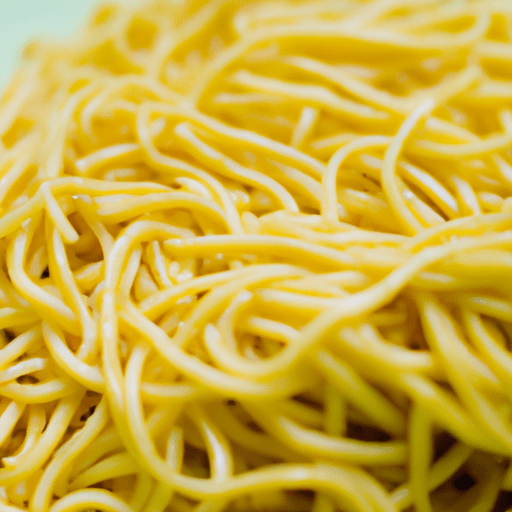The Wonderful World of Egg Pasta
If you’re a pasta lover, it’s hard to resist the allure of silky, golden egg pasta. With its luxurious taste, versatile nature, and intriguing history, it has become a staple in many cuisines around the world. In this blog post, we will dive into the delightful world of egg pasta, exploring its taste, common uses in cooking, nutritional value, and some interesting facts that you may not know.
Taste and Texture of Egg Pasta
Egg pasta, as the name suggests, is made by combining flour and eggs. The addition of eggs adds a rich and delicate flavor to the pasta, enhancing its overall taste. The surface of egg pasta becomes beautifully golden when cooked, offering a visual treat to anyone lucky enough to see it on their plate.
In terms of texture, egg pasta is known for its tender and smooth mouthfeel. The eggs contribute to its velvety texture, making it a pleasure to eat. Whether you choose to enjoy it al dente or fully cooked, egg pasta remains satisfyingly soft and chewy.
Common Uses in Cooking
Egg pasta is incredibly versatile and can be used in countless delectable dishes. It pairs wonderfully with both rich and light sauces, allowing you to get creative in the kitchen. Some popular preparations include:
- Classic Carbonara: Tossing cooked egg pasta with crispy bacon, Parmesan cheese, and a generous amount of freshly ground black pepper creates a rich and satisfying Carbonara dish.
- Delicate Soups: Egg pasta shines in delicate soups like broths and consommés. Its light texture adds a delightful touch to any soup or broth-based dish.
- Homemade Ravioli: Egg pasta is an excellent choice for making ravioli from scratch. Whether filled with ricotta and spinach or a rich meaty filling, these tender pockets of pasta are a true culinary delight.
The possibilities are endless, and egg pasta is sure to elevate any recipe it graces.
Nutritional Value
Egg pasta offers a decent nutritional profile, making it a favorable choice for those seeking a balanced diet. It contains essential nutrients such as protein, vitamins, and minerals. The eggs in the pasta are an excellent source of high-quality protein, providing the body with amino acids necessary for tissue repair and growth. Additionally, it contains vital minerals like iron and potassium, which support overall health.
While it’s important to enjoy egg pasta in moderation, it can be part of a healthy and well-rounded diet when combined with a variety of nutrient-rich ingredients.
A Brief History and Fascinating Facts
Egg pasta has a rich history that stretches back centuries. Its origins can be traced to ancient China, where noodles were made by hand and then brought to Italy through Arab traders during the Middle Ages. Italians adopted the technique, adding eggs to create what we now know as egg pasta. This culinary masterpiece quickly captured the hearts and taste buds of Italians and eventually spread throughout Europe and the rest of the world.
Today, various regions in Italy are renowned for their unique egg pasta recipes. From the tagliatelle of Emilia-Romagna to the pappardelle of Tuscany, each region takes pride in its distinct variation, showcasing the artistry and diversity that embodies Italian cuisine.
Did you know that the width of the pasta shape plays a role in the sauce it pairs best with? Thinner egg pasta, like angel hair and spaghetti, is perfect for light, oil-based sauces, while wider shapes, such as fettuccine and tagliatelle, are better suited for cream-based or meaty sauces. This attention to detail is what sets egg pasta apart and adds to its culinary appeal.
Embrace the Delightful Egg Pasta
Egg pasta is a true joy to cook with and savor. Its luscious taste, versatility, and rich history make it a beloved staple in the world of culinary delights. So, whether you’re cooking for a special occasion or simply treating yourself to a delicious meal, consider indulging in the wonders of egg pasta. Your taste buds will thank you!
Egg Pasta
Origin: Egg pasta, also known as fresh pasta, has its origins in Italy. It is believed to have been introduced during the Renaissance period in the 14th century.
Common uses: Egg pasta is commonly used to make various pasta dishes like lasagna, fettuccine, tagliatelle, and tortellini. It can be paired with a wide range of sauces, from simple tomato-based sauces to rich cream-based sauces.
Nutritional benefits: Egg pasta contains essential nutrients such as proteins, carbohydrates, vitamins, and minerals. The egg in the pasta provides a good source of high-quality protein and also contributes to the pasta’s texture and flavor.
Unique properties: The addition of eggs gives fresh pasta a rich, yellow color and a pleasantly tender texture when cooked. It also renders the pasta more flavorful compared to dried pasta. The proteins in eggs contribute to the pasta’s structure, making it more resistant to overcooking.
Historical significance: In medieval and Renaissance Italy, pasta made with eggs was considered a luxury food, as eggs were relatively expensive. Fresh egg pasta was often served to nobility and wealthy merchants. Over time, as eggs became more affordable, this type of pasta became more accessible to the general population.
Remember, fresh egg pasta should be cooked in boiling salted water for a shorter time than dried pasta, as it cooks much faster due to its higher moisture content.




Use the share button below if you liked it.
It makes me smile, when I see it.